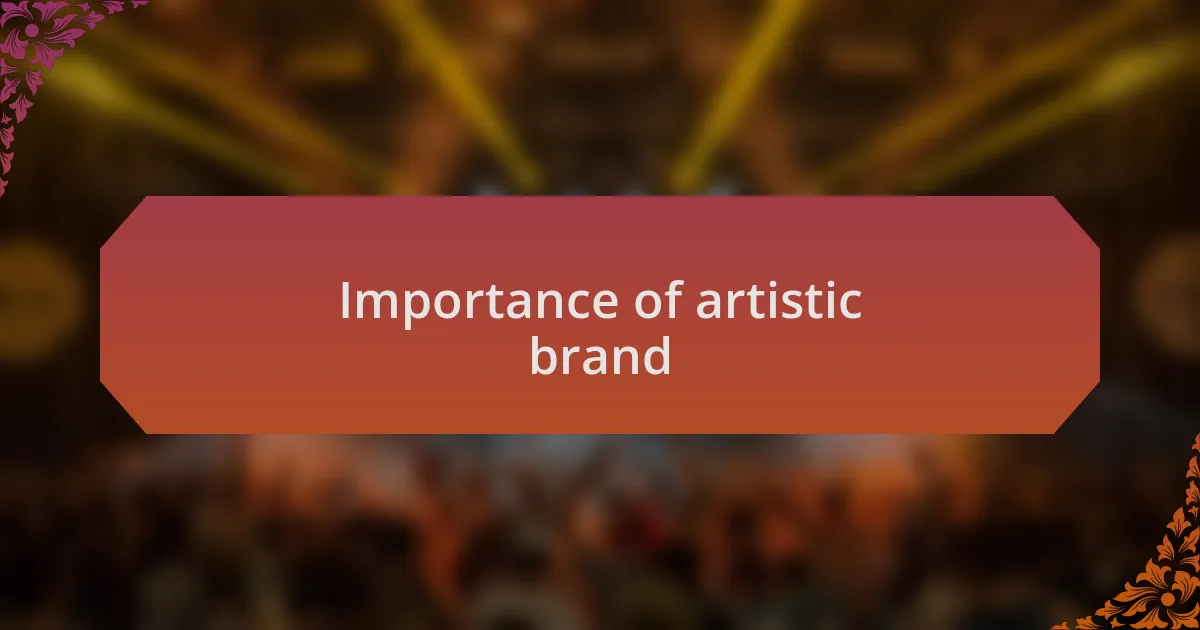Key takeaways:
- Artistic branding is about crafting a compelling narrative that reflects personal experiences and connects with the audience.
- Consistency and clarity in branding help build trust and loyalty among fans while ensuring a unified message across all artistic outputs.
- Engagement with the audience provides valuable feedback that can shape future creative directions and strengthen brand connections.
- Regular evaluation of brand alignment with personal growth is essential for maintaining relevance and authenticity in artistic expression.

Understanding artistic branding
Artistic branding goes beyond just a logo or aesthetic; it’s about creating a narrative that resonates with your audience. I remember working with a musician who was unsure of how to present himself. We discovered that his journey—from his humble beginnings to his aspirations—was his most powerful tool. This personal story became woven into everything from his album art to his social media presence.
When I think about the artists I admire, it’s clear that their brands reflect their values and personalities. For instance, an artist who stands up for social issues can connect deeply with listeners who share those beliefs. It leads me to wonder: how do your personal experiences shape the way you want to be perceived? The answer can create a compelling branding narrative that engages your audience on a deeper level.
In my experience, consistency is key. An artist’s brand should feel unified, whether through visuals, music, or messages. I once attended a concert where the performer’s stage setup matched the vibe of his latest album perfectly, creating an immersive experience. This reminded me of how important it is to ensure every aspect of your branding speaks the same language, striking a chord with your fans and building loyalty.

Importance of artistic brand
Artistic branding is crucial because it allows artists to carve out a unique space in a crowded marketplace. I once collaborated with a visual artist who had a distinct style that set her apart; her brand was not just about her artwork but also about how she interacted with her community. This connection transformed her followers into loyal fans—people who felt personally invested in her journey.
One striking aspect of establishing a strong artistic brand is the emotional resonance it carries. I recall a band I followed closely; their music spoke of love, loss, and resilience. Their brand encapsulated these themes, effectively communicating their message in interviews, album covers, and performances. This level of emotional engagement made their music feel more profound, as if it reflected my own experiences. Have you considered how your various creative outputs reflect your personal struggles and achievements?
Ultimately, an artistic brand shapes the artist’s narrative and builds trust with the audience. I remember meeting a songwriter who shared his fears and vulnerabilities in his lyrics. This honesty not only endeared him to fans but also invited them to share their own stories. It made me appreciate the power of transparency, leading me to ask: how can sharing your truth enhance your artistic brand’s authenticity?

Characteristics of a strong brand
One characteristic of a strong brand is its clarity. I remember supporting a local artist whose message was unmistakably clear: he wanted to empower listeners through his music. This clarity not only made it easy for fans to understand who he was but also helped him to attract a dedicated audience that resonated with his vision. Have you ever encountered a brand that left you feeling energized or inspired due to its straightforward messaging?
Consistency is another vital trait that I have seen in successful brands. A friend of mine runs an independent label and emphasizes that every release—whether an album, a music video, or social media post—stays true to its core aesthetic and values. This unwavering consistency builds trust over time, allowing fans to know what to expect and reinforcing the emotional connection to the music. How often do you reflect on whether your own creative outputs align with your brand’s values?
Lastly, a strong brand is adaptable. I once came across a musician who seamlessly integrated different musical genres into her work as her career evolved. While she maintained the essence of her brand, her ability to adapt to new trends and influences kept her relevant in an ever-changing industry. This flexibility invites growth and experimentation, enriching the artist’s brand in ways that static approaches simply can’t. Have you considered how embracing change could enhance your artistic identity?

Steps to develop your brand
To develop your brand, the first step is defining your identity. I remember sitting down with an artist friend to brainstorm what made her unique. We crafted a list of her influences, values, and goals, which revealed a distinct narrative that guided her music and merchandise. Have you taken the time to uncover your own narrative? Understanding who you are at your core is essential for creating an authentic brand.
Next, visual consistency can’t be overlooked. When I was working on my label’s promotional materials, I realized that every album cover, poster, and social media graphic needed to reflect a unified visual language. This doesn’t just mean using the same colors; it’s about creating a cohesive vibe that resonates with your message. I often ask artists if they’ve thought about how their visuals communicate their story—are they telling the same story visually as they are musically?
Finally, engagement with your audience is crucial. After a show, I would often chat with fans to learn what they loved about the performance. These conversations provided invaluable insights that shaped future musical directions and marketing strategies. How often do you reach out to your community for feedback? Building a brand is not just about self-expression; it’s also about forging a connection with the people who support you.

Connecting brand to your music
Connecting your brand to your music is about weaving a narrative that resonates deeply with your audience. I remember the excitement I felt when a musician I worked with decided to share personal stories in their lyrics that reflected their journey. It was eye-opening how those raw emotions translated into a stronger connection with fans—people started to see themselves in the music, making it more than just sound but a shared experience. Have you thought about how your life influences your art?
Your music’s sound and themes should echo the essence of your brand. I once collaborated with an artist who had a distinct sound that suddenly shifted with their branding efforts; the music felt disjointed from their imagery. It was a reminder that every note and lyric needs to reinforce the image you’re creating. What do you want listeners to feel when they hear your songs?
Lastly, your brand should evolve alongside your music. I recall the journey of another artist who started with a folk sound and gradually embraced electronic elements. As their style changed, so did their branding, allowing them to communicate their growth to fans effectively. This transformation kept their audience engaged and curious. How do you envision your brand growing in harmony with your music?

Personal reflections on branding journey
Reflecting on my branding journey, I often think about the moments that shaped my understanding of what makes a brand truly resonate. Early on, I facilitated a showcase where artists paired their music with visual art that spoke to their personal stories. Watching the synergy unfold was fascinating; it made me realize that authenticity is the glue that holds a brand together. Have you found that connecting your music with genuine narratives strengthens your artistic identity?
One time, a friend who was an aspiring artist faced a crucial decision about her visual style. After much discussion, she transformed her look, aligning it with the raw, unfiltered essence of her music. The result was a captivating, cohesive presence that captivated audiences and fueled her confidence. It’s a reminder that sometimes, taking risks in branding can lead to profound personal and professional growth. Are you ready to step beyond your comfort zone to find what truly represents you?
As I continue my branding journey, I see it as a constant evolution, much like the music itself. There was a phase when I experimented with different genres and the way I presented myself online. The excitement of trying something new ignited a passion in me, but it also highlighted moments of uncertainty. Engaging with my audience during these transitions helped me clarify my message. What’s your experience with navigating changes in your artistic brand?

Tips for maintaining your brand
To maintain your brand, consistency is key. I remember when I decided to adopt a specific color palette and style for all my promotional materials. It was a simple change, but it created a visual language that my audience quickly recognized. Have you thought about how even small design choices can strengthen your brand identity?
Engaging with your audience on social media can be a powerful way to keep your brand alive. I often share behind-the-scenes stories and updates about my projects, making my followers feel like they’re part of the journey. This connection has led to an organic growth in my fanbase—what strategies have you used to foster that same engagement?
Regularly evaluating your brand’s direction is essential for its longevity. I find it helpful to take time every few months to assess whether my messaging still aligns with my evolving artistic vision. This practice not only keeps my brand relevant but also allows me to focus on what truly excites me creatively. How often do you reflect on your brand’s alignment with your personal growth?